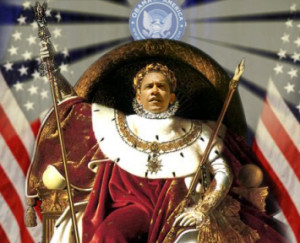(FOX News) Imperial President Obama’s decision to suspend the ObamaCare Employer Mandate may be a welcome relief for businesses affected by this provision but it raises serious concerns about his understanding of the role of the Executive branch in our system of government.
Article II Section 3 of the U.S. Constitution states, “he shall take care that the laws be faithfully executed.” This is a duty, not a discretionary power–while the president does have substantial discretion about how to enforce the law, he has no discretion about whether to do so.
This matter–the limits of Executive power has deep historical roots. During the period of royal absolutism, English monarchs asserted a right to dispense with parliamentary statues they disliked.
King James II use of prerogative was a key grievance that led to the ‘Glorious Revolution of 1688’ —The first provision of the English Bill of Rights of 1689 was the most important precursor of our Constitution–declared that, ‘the presidential power of suspending of laws or the execution of laws by regal authority without consent of parliament is illegal.’
Like King James, a president’s decision not to enforce laws he doesn’t like is an abuse of power.
Of all the stretches of Executive power Americans have seen the last few years, President Obama’s unilateral suspension of statues may have the most disturbing long-term effects. As the Supreme Court noted in
Kendall -v- United States (1838) 37 U.S. 524 allowing the president to refuse to enforce statues passed by Congress, ‘would be clothing the President with a power to control the legislation of Congress and paralyze the administration of justice.’
Republican opponents of ObamaCare may say the suspension of the employer mandate is such good policy that there is no need to worry about it’s constitutionality writes Hot Air but if the president can dispense with laws and parts of laws that he disagrees with, the implication of constitutional government are dire.
Full article here by Judge Michael McConnell/WSJ
Tweet Paranoid King Obama, Could Eat at Capitol Hill Meeting Without Official Food Taster –Image: Grumpy Opinions
Paranoid King Obama, Could Eat at Capitol Hill Meeting Without Official Food Taster –Image: Grumpy Opinions